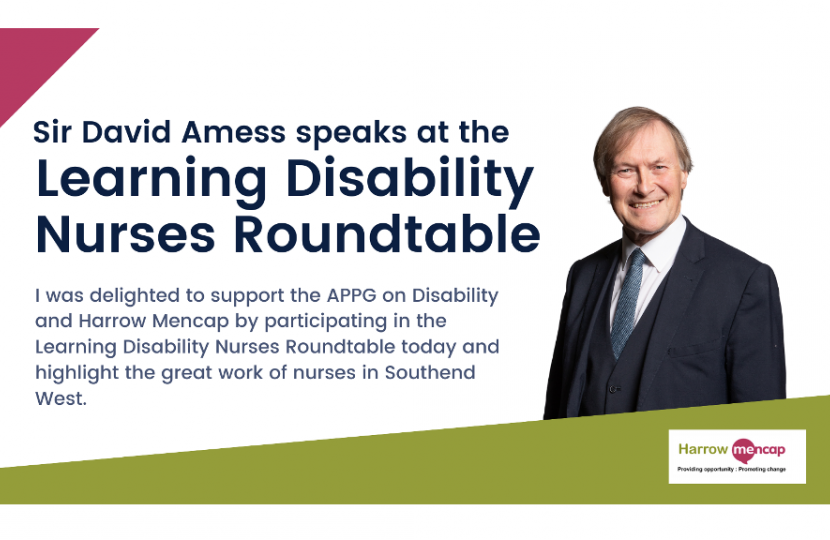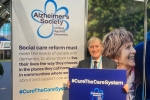
On Tuesday 8 June, Sir David Amess spoke at the Learning Disability Nurses Roundtable and called for more of these nurses in Southend Hospital and for specific training for nurses. Sir David also spoke about how important community engagement for these nurses is and as a patron of the Music Man Project, he encouraged everyone who can to attend their local day centre.
Sir David said:
Only a few decades ago, people with learning disabilities were hidden away in mental hospitals and not given the proper care and support they needed. The Coronavirus pandemic presents a unique opportunity to reflect on the social support mechanisms and the medical treatment of a once forgotten society.
As of May 2021, there have unfortunately been 81 individuals with learning difficulties in Southend, Essex and Thurrock who died of Coronavirus. There is a healthcare inequality for people with learning disabilities and the need to address this has become even more urgent with the pandemic. These individuals did not typically have anyone with them in hospital and on discharge, there was often confusion and information did not go with them to their carer.
The wonderful Music Man Project which was founded in Southend by David Stanley is an international music education service for children and adults with learning disabilities. It is so much more than just that though – it provides life-changing performance opportunities for people who face extraordinary challenges every day of their lives. I certainly do encourage people to attend their local Music Man Project day centres.
The NHS should look more into the health benefits of therapeutic activities such as music, dance and art as they can play both a preventative role before hospitalisation and aid recovery post treatment. This is already explored for dementia patients, but more should be done for people with learning disabilities.
There is no doubt that specialist learning disability nurses are vital, but we need to recruit more as a matter of urgency in order to truly see their benefit at scale. There should be a team of specialist learning disability nurses in every hospital to meet the requirements of different syndromes, conditions, age groups and behaviours. The learning disability nurse at Southend Hospital does a wonderful job of caring for her patients, but she is the only one there. We must train more nurses specifically and widen the scope of their practice to allow more people access to the support they so crucially need. I am pleased that learning disability awareness training is mandatory in Southend Hospital, but this needs to be the case nationally.
New nurses should be taught the specific needs of people with learning disabilities as part of a compulsory module in medical training and practical, hands-on engagement in the community. Opportunities to understand and appreciate the community will motivate staff to want to specialise in this area. If the deep understanding and trust that is achieved through engaging projects can be replicated in hospitals, then health outcomes will improve. This awareness cannot be manufactured in a training seminar or understood in the pressures of A&E or hospital wards. It needs to be experienced through community participation.
Support for people with learning disabilities shouldn’t begin and end at the hospital. Community engagement, effective communication, awareness and understanding can all contribute to better health outcomes. They build trust, experience and expertise, and can change perceptions about treatment in hospitals which encourages people with learning disabilities to seek help earlier. It is also recommended that we review the way deaths are being recorded for people with Cerebral Palsy, Learning Disability and Downs Syndrome as they cannot be the direct cause of death.
In conclusion, one positive outcome of the Coronavirus pandemic should be a greater understanding of the best ways to serve a section of society who are often grouped together as a single type, namely “disabled”. There is enormous diversity within disability, and we all have a responsibility to provide appropriate and targeted medical treatment, care, support and opportunity across this vast range. Most fundamental is the treatment of people with learning disabilities in hospitals as the majority of this community cannot bring about change for themselves. Women with a learning disability and/or autism die 27 years younger than the wider population and men die 23 years younger. People with learning disabilities and/or autism died at a rate 6.3 times higher than the wider population between 21 March and 5 June 2020. These terrifying statistics show that much more work needs to be done. We must build on the great reforms of the past, which brought these people from isolation in remote mental hospitals to being cared for in the community.

